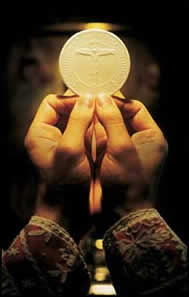(Another of my recent articles from Catholic Insight.)
When I ask my Protestant friends (some of whom, sadly, are ex-Catholics) the question, “Why do you worship where you do, as opposed to somewhere else, some other congregation?” the answers vary: “I like the preaching.” “I like the music – love that contemporary Christian worship.” “I like the nursery program for my kids.” “I like the fact that it’s close to my home.”
Yet the answers, although different, are also strangely alike – for they all have a common theme: “I”. “I like this; I prefer that. This is the worship that I like.”
But what kind of worship does God like?
Throughout salvation history, we do not see flexibility on God’s part here. God has always had a preference in these matters as well, a way he “likes” to be worshipped. In the Old Covenant, it was the temple liturgy that was central to the worshipping life of all Israel.
But what about the New Covenant? Is a multiplicity of worship forms acceptable in the New Testament Church, as my friends would believe?
Here is how the brilliant Catholic convert Thomas Howard puts it, in his book On Being Catholic: “Christian worship did not proliferate randomly. There was a shape given to it in the beginning…it is not as though the apostolic community cast about for ingredients that might be appealing to local Jewish converts, or to Greeks, or to Scythians, Romans, Egyptians, or Parthians, least of all to that ubiquitous figure, ‘contemporary man’. No market research was brought into play. No caucuses – of youth, or of senior citizens, or of the affluent or the indigent, or of women, or of men, or of anyone else – were heard from. No theologians or reformers or charismatic leaders or prophets dictated the shape of things” (p.39).
And the shape of things was the Mass, received “from the hands of Jesus Christ himself”, as Howard puts it.
Worship has always been a gift from the “top down”, from God to us, rather than something cooked up by us – from the “bottom up”, so to speak. I often hear complaints from fellow Catholics regarding the lack of participation or interest in the Mass by many, especially the young. As Catholics, we are “born again” in Baptism, but often many of us seem “bored again” each time we go to Mass! How do we get people more involved? The solution, according to some, is to “Protestantize” our worship with more “entertaining” elements: electric guitars, contemporary worship styles, perhaps a more informal atmosphere – you know, the stuff people “like”.
As a “Pre-16” Joseph Cardinal Ratzinger reminds us in his book The Spirit of the Liturgy, this attitude is fraught with danger. In speaking of Israel’s apostasy in their worship of the golden calf, he writes:
“The people cannot cope with the invisible, remote, and mysterious God. They want to bring him down into their own world, into what they can see and understand. Worship is no longer going up to God, but drawing God down into one’s own world…Man is using God…he is placing himself above God…Worship becomes a feast the community gives itself, a festival of self-affirmation. Instead of being worship of God, it becomes a circle closed in on itself: eating, drinking, and making merry…self-seeking worship. It is a kind of banal self-gratification. (The)golden calf is a warning about any kind of self-initiated and self-seeking worship. Ultimately, it is no longer concerned with God, but with giving oneself a nice little alternative world, manufactured from one’s own resources. Then liturgy does become pointless, just fooling around. Or still worse it becomes an apostasy from the living God, an apostasy in sacral disguise. All that is left in the end is frustration, a feeling of emptiness. There is no experience of that liberation which always takes place when man encounters the living God” (p. 23).
The true worship, the Mass, is a gift from God. We must be educated about it in order to understand it. And we must understand it in order to appreciate it. And we will find that, in the end, we will “like” it, as God likes it, because it will set us free: “that liberation which always takes place when man encounters the living God”.



Leave a Reply
Want to join the discussion?Feel free to contribute!